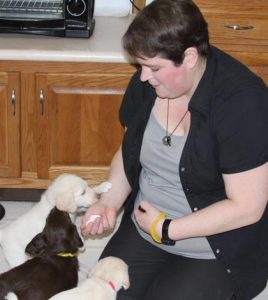Local service dog trainer is rare breed

Pictured, McNeight trains a few of the puppies she is socializing on detecting the scent of low blood sugar in a person with diabetes. (Sean McGowan photo)
By SEAN MCGOWAN
For the Republic-Times
As the founder of Service Dog Academy, Mary McNeight, 39, brings nearly 10 years of experience in medical alert service dog training to Monroe County.
McNeight, who recently moved to Waterloo from Seattle, performs medical alert training with dogs whose owners suffer from diabetes, chronic migraines, seizures or narcolepsy.
Her journey began in 2005, when she discovered she would need to train her dog to help her with her anxiety and major depression.
“There’s just a big dog culture (in Seattle), and no one would help me train my own dog,” she told the Republic-Times.
Several years later, McNeight began offering a program to train people’s dogs to become medical alert service dogs. She uses only methods approved by the American Humane Association, which promotes the welfare of animals.
“You want to make sure they’re happy throughout their training because otherwise they’re just going to be scared of you,” she said.
“We want them to love their jobs, and the way we do that is with rewards,” she added, explaining that rewards include treats and words of praise.
Her next training series will take place from 1 to 4 p.m. March 16-19 at the Hampton Inn in Columbia. For more information or to sign up for the class, go to servicedogacademy.com, call 206-355-9033 or email info@servicedogacademy.com.
McNeight is a graduate of the only dog training degree program in the state of Washington. As a certified professional dog trainer, she provides services for more than 125 students in countries such as Australia, France, India, Brazil, Israel, Canada and others.
“I’m one of only about 10 people with medical alert training experience,” she said.
One of the necessities of a diabetes medical alert dog is the ability to smell when a diabetic’s blood pressure is low. To train a dog in this specialty, a person would need to spit on a cotton ball, then pair the smell of the cotton with food.
Once the dog begins to recognize the smell on the cotton, the person would train the dog to perform some sort of trick, such as spin in a circle or shake. The dog would eventually know to do the trick every time it smelled the low blood sugar to alert the person.
Currently, McNeight is training puppies for medical alert services and for socialization purposes. Socialization involves teaching the puppies to behave around humans and other dogs.
“The best vaccine you can give a puppy is socializing it,” McNeight said. “Undersocialization is the number one killer of puppies.”
McNeight said she is working on socializing the puppies by exposing them to a number of people, using Oak Hill senior care center, boy scouts and girl scouts, among others. The goal is to expose a puppy to at least 100 different people prior to eight weeks of age, she said.
The eight puppies will go to homes at eight-and-a-half weeks, with some of them designated as pets and some as service dogs — only three of the puppies are still available for adoption. They are now seven weeks old.
At the end of the month, McNeight will be hosting a puppy socialization costume party. McNeight said the costume aspect is to get the puppies used to the diversity among people.
“It’s a way to teach them that just because someone looks different, it doesn’t mean they’re scary,” she said.
The party, at which McNeight can host up to eight people, takes place at 6 p.m. next Tuesday. Contact McNeight for more details.






